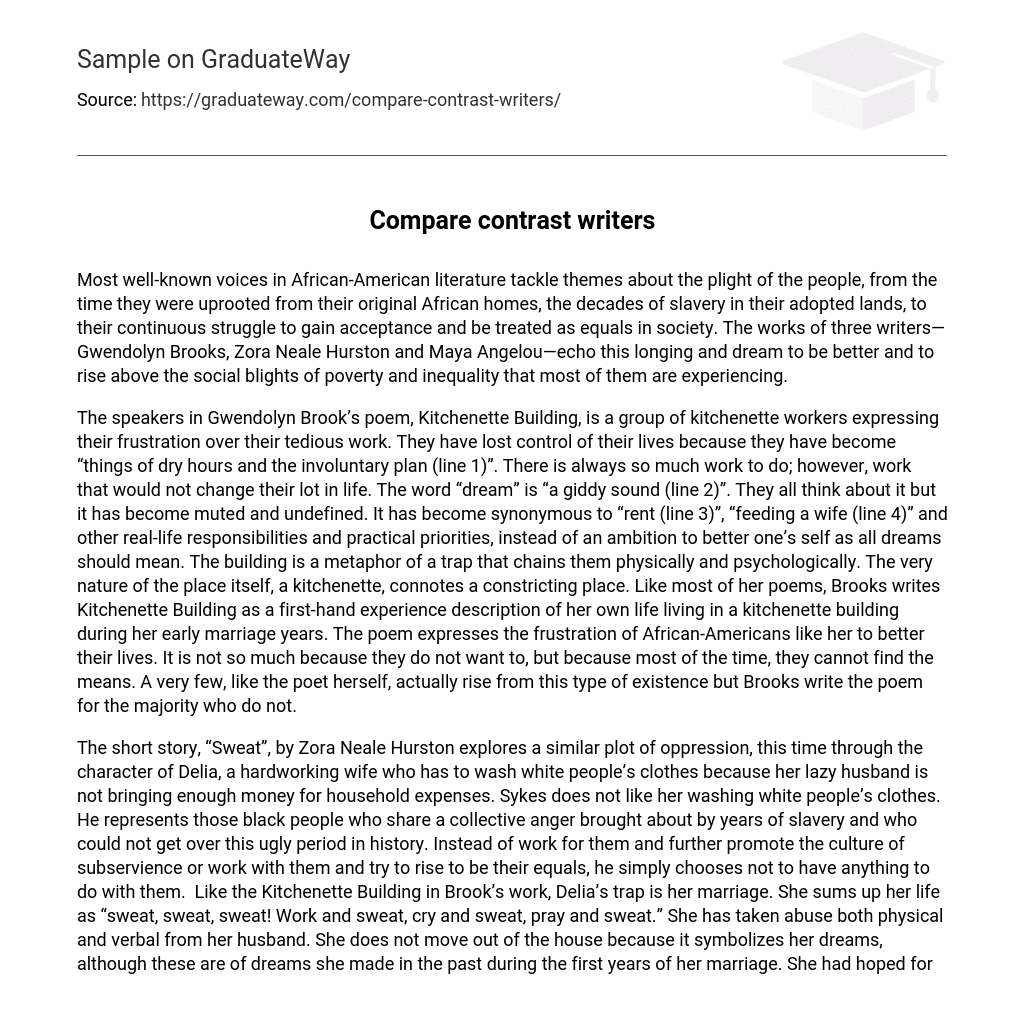Most well-known voices in African-American literature tackle themes related to the plight of their people. This includes their uprooting from their original African homes, decades of slavery in adopted lands, and continuous struggle for acceptance and equality in society. The works of three writers – Gwendolyn Brooks, Zora Neale Hurston, and Maya Angelou – echo this longing for a better life and a desire to rise above the social blights of poverty and inequality that many experience.
In Gwendolyn Brooks’ poem, Kitchenette Building,” the speakers are a group of kitchenette workers expressing their frustration over their tedious work. They have lost control of their lives because they have become “things of dry hours and the involuntary plan” (line 1). There is always so much work to do; however, this work would not change their lot in life. The word “dream” is described as “a giddy sound” (line 2). They all think about it, but it has become muted and undefined. It has become synonymous with “rent” (line 3), “feeding a wife” (line 4), and other real-life responsibilities and practical priorities instead of an ambition to better oneself as all dreams should mean.
The building itself is a metaphor for a trap that chains them physically and psychologically. The very nature of the place itself, a kitchenette, connotes a constricting place. Like most of her poems, Brooks writes Kitchenette Building from first-hand experience living in such conditions during her early marriage years.
The poem expresses the frustration experienced by African-Americans like her who want to better their lives but often cannot find the means to do so. A few individuals rise from this type of existence like Brooks herself did; however, she wrote this poem for those who remain trapped.
The short story Sweat” by Zora Neale Hurston explores a plot of oppression through the character of Delia, a hardworking wife who washes white people’s clothes because her lazy husband does not bring in enough money for household expenses. Sykes, Delia’s husband, represents black people who share collective anger brought about by years of slavery and who cannot get over this ugly period in history. Instead of working with or for them to promote equality, he chooses not to have anything to do with them. Like the workers in Gwendolyn Brooks’ poem “Kitchenette Building,” Delia’s trap is her marriage. She sums up her life as “sweat, sweat, sweat! Work and sweat, cry and sweat, pray and sweat.” Despite physical and verbal abuse from her husband, she remains in the house because it symbolizes her dreams from early years of marriage that did not come to pass. Dreams are made at the beginning but are slowly set aside under mountains of responsibilities and present concerns.At the end of the story Fate intervenes for Delia when Sykes brings home a snake to frighten her into submission; instead it kills him with its poison. His death becomes her freedom. Unlike the workers in “Kitchenette Building,” whose freedom would be more than what Fate could deliver alone.Hurston lived during an earlier time when black freedom was just beginning; thus she was able to write about slavery and segregation with painful sincerity which newer writers could only reinvent or generalize upon. Brooks’ poetry along with Maya Angelou’s writing focuses on latter struggles towards equality while Hurston wrote about transition from confusion about black situations towards awkwardness or even resistance others had accepting concepts like equality or non-segregation.
Maya Angelou’s Still I Rise” provides a hopeful and optimistic perspective on the same dreams that are discussed in Brooks’ poem and Thurston’s story. The grand scope of Angelou’s poem mirrors the tone of pride and celebration of black heritage and history mentioned within its lines. Unlike the defeated speakers in Brooks’ poem, Angelou’s speaker expresses resilience from the very beginning. While Delia allows herself to be abused by her husband and remains submissive, Angelou’s speaker fights back against those who criticize her “sassiness,” “haughtiness,” and “sexiness.”
At the start of her poem, she acknowledges the sad and ugly history of her people due to others who tried to “trod me in the very dirt (line 4).” However, instead of being defeated, she rises “like dust (line 1).” The poet addresses a white audience throughout the piece. She is referring to white individuals as those who have caused slavery and oppression among black people.
Despite facing hatefulness and disappointment from whites over her unexpected behavior–the haughtiness uncommon among blacks–she shows them that she will not allow herself or her people to be trampled upon any longer. According to Angelou, she is “the gift that my ancestors gave/, I am the dream and hope of a slave (lines 39-40).” Her generation represents a culmination of past struggles; it is a realization beyond what Brooks’ poem or Thurston’s story could have imagined.
Although Angelou has written about suffering brought about by racial oppression in earlier works, unlike these two writers, most of her well-known pieces celebrate African-American culture rather than dwelling on past pains.
The three literary works discussed all tackle the theme of the African-American dream to rise above a history of slavery and oppression. Although their tones may differ, hopefulness is present in all three. Even in the face of hopelessness, there is always a glimmer of possible change. Contemporary writers continue to write about these subjects so that the world will not forget what African-Americans have gone through to gain what they have today and so that cases of oppression will cease to exist for these people.
Works Cited
Maya Angelou’s poem I Rise” is a powerful declaration of strength and resilience. Through her words, she encourages readers to rise above adversity and embrace their own inner power.
Brooks, Gwendolyn’s poem Kitchenette Building.
Neale, Zora Thurston’s Sweat” is a short story that explores the life of a washerwoman named Delia Jones. The story delves into themes of domestic violence, oppression, and resilience.





